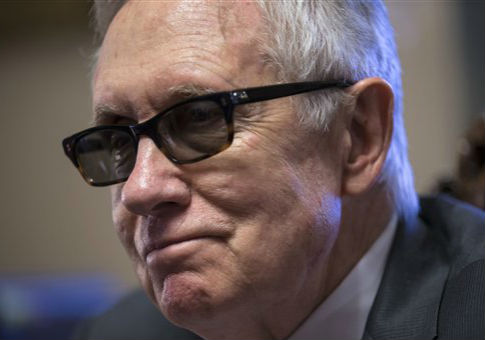Sen. Harry Reid (D., Nevada) is seeking an exemption to rules about the use of campaign and leadership PAC funds to help cover the costs of winding down his Senate office and to hire a personal assistant to help with tasks once he departs from Congress.
The request was sent to the Federal Election Commission on Oct. 22, 2015 and states that Sen. Reid anticipates having a "substantial post-retirement obligations arising from a 34-year tenure as a federal officeholder" and argues that his responsibilities will not cease once he leaves Washington. As a result, he needs to hire a full-time assistant to "review, organize, and arrange for transportation and storage of archival and office materials" as well as schedule appearances in which Reid will discuss his time in office.
The request was written and submitted by Marc Elias, a partner at the Washington, D.C.-based Perkins Coie law firm. Elias is also currently acting as the top campaign lawyer for Hillary Clinton and has been described as "Harry Reid and Barack Obama’s personal political attorney."
Elias additionally asked whether the senator may use funds from his leadership PAC, the Senate Majority PAC, to pay wind-down costs. Current FEC rules strictly prohibit the use of campaign and leadership PAC funds for personal use.
During an open meeting on Dec. 17, 2015, the FEC Commission debated the request in which one commissioner, Lee Goodman, expressed deep concern over the precedent it would set if approved.
"I guess my fundamental concern about where we're being asked to open this door further than winding down costs is that the benefits that will accrue to all members of Congress under this read will be all campaign funds, will then be available to fund the administrative overhead of being a former member of Congress, and to maintain their speaking, writing, so long as they discuss the fact that they were a former member of Congress, and there is nothing particularly unique or necessary about this choice," Goodman said.
Ann Ravel, chairwoman of the commission, came to Reid’s defense, arguing that he deserves a special exemption from the rules given his importance.
"This is applicable to a person who has been the majority leader for many years, who has performed an important function in our government for many years, who probably during that time had so much to do that he was unable to do some of the things that's necessary, not only for the winding down of the office but also to be able to communicate to the American public as an important figure and public official, not necessarily as just a person who's been there a couple of years and is trying to make personal use of their campaign funds," Ravel said.
"In fact, it’s being constrained," she continued. "It obviously can’t be used for any activity that will remunerate him in any way. So he can’t do it for book tours or for any other activities that are beyond what would be a public purpose here, and I see this draft A, which I whole heartedly support, as being the appropriate mechanism for a person who will continue to be doing a public service as a historic figure in our country, to achieve purposes that are important to the American public."
Goodman disagreed, saying the draft supported by Ravel would "allow every member of Congress to have an administrative fund to travel around the world on a book tour so long as they are not earning a royalty from the book."
A response on the matter was delayed and has since been scheduled for January 25, a spokesman for the FEC said.
Goodman and Ravel did not return a request for comment. Reid’s office also did not return email inquiries. Additionally, Marc Elias did not respond by press time.
